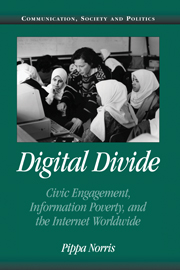Book contents
- Frontmatter
- Contents
- List of Tables
- List of Figures
- Preface
- PART I INTRODUCTORY FRAMEWORK
- PART II THE VIRTUAL POLITICAL SYSTEM
- PART III THE DEMOCRATIC DIVIDE
- 10 Cyberculture
- 11 Civic Engagement
- 12 Conclusions: Promoting e-Democracy
- Appendix A Nations in the Study and Abbreviated Names Used in Figures
- Notes
- Select Bibliography
- Index
11 - Civic Engagement
Published online by Cambridge University Press: 05 June 2012
- Frontmatter
- Contents
- List of Tables
- List of Figures
- Preface
- PART I INTRODUCTORY FRAMEWORK
- PART II THE VIRTUAL POLITICAL SYSTEM
- PART III THE DEMOCRATIC DIVIDE
- 10 Cyberculture
- 11 Civic Engagement
- 12 Conclusions: Promoting e-Democracy
- Appendix A Nations in the Study and Abbreviated Names Used in Figures
- Notes
- Select Bibliography
- Index
Summary
In many democracies there is widespread concern that the public has become more and more disenchanted with the core institutions of representative democracy and disillusioned with the traditional channels of political participation. The substantial literature on cyber-democracy commonly claims that the Internet provides a distinctive structure of opportunities that has the potential to revive civic engagement, especially for many peripheral groups currently marginalized from mainstream politics. “Civic engagement” can be understood to include three distinct dimensions: political knowledge (what people learn about public affairs), political trust (the public's orientation of support for the political system and its actors), and political participation (conventional and conventional activities designed to influence government and the decision-making process). But will hopes for a virtual democratic revival be realized? There remains concern that given the pattern of unequal technological access demonstrated in earlier chapters, political resources available via the Internet will empower those with the resources and motivation to take advantage of them, stranding the disengaged farther behind. After outlining theories around this issue, this chapter goes on to analyze survey evidence to examine political participation within the online community in the United States and Western Europe.
MOBILIZATION AND REINFORCEMENT THEORIES
The previous chapter demonstrated the influence of the Internet on changing cultural values. The focus here is the participation hypothesis, which suggests that digital politics will affect public affairs either through the mobilization of new groups or the reinforcement of those who would participate through traditional channels, as illustrated in the typology in Figure 10.1.
- Type
- Chapter
- Information
- Digital DivideCivic Engagement, Information Poverty, and the Internet Worldwide, pp. 217 - 231Publisher: Cambridge University PressPrint publication year: 2001



